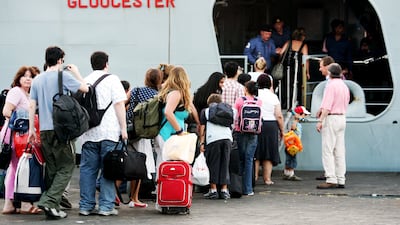Live updates: Follow the latest on Israel-Gaza
Britain is drawing up plans to evacuate citizens from Lebanon and Israel, in operations that could resemble those seen in the 2006 Israel-Hezbollah war.
There are thought to be about 16,000 Britons in Lebanon and 60,000 in Israel.
A retaliatory strike from Iran or the Lebanese militia Hezbollah is expected after Tehran blamed Israel for the killing of Hamas' leader Ismail Haniyeh. Israel has not commented on the strike which killed Mr Haniyeh.
The UK is increasingly anxious that this could trigger a regional war.
Those in Lebanon were told last week to “leave now” by Foreign Secretary David Lammy, as airlines including Lufthansa and Swissair suspended flights to and from the country.
Additional consular staff, Border Force officers and military support have been sent to bolster British embassy teams across the Middle East, including Lebanon.
“While we continue to use all diplomatic levers to push for de-escalation, our staff are working around the clock to plan for all scenarios to keep British nationals safe. Our travel advice is constantly updated to reflect the latest guidance,” a government official said.
Yet ministers are thought to be considering a multi-phased evacuation route by sea from Lebanon to Cyprus, similar to the 2006 Royal Navy evacuations from Lebanon, which were code-named Operation Highbrow.
The Foreign Office is also said to be looking at options to evacuate Britons from Israel in the event of a regional war after an Iranian air strike.
Israel’s shelling of the south of Lebanon and part of Beirut during its last war with Hezbollah in 2006 saw thousands of UK citizens successfully removed from Lebanon in British warships.
“No nation could have got there more quickly or done it more professionally than we did,” former admiral Bob Cooling, who captained one of the warships evacuating people, said at the time. But new dynamics make a re-run of the operation less certain.
Reasons to stay
There are doubts as to whether those remaining in Lebanon are ready to leave.
Operators Air France and Transavia resumed flights to Lebanon on Thursday, giving a new window for those seeking to leave immediately.
“Anyone who wants to leave will be on those flights,” said Dr HA Hellyer, senior associate in international security studies at the Royal United Services Institute.
However, many are held back by personal circumstances. “Most of the people remaining now are there because of family obligations and practicalities, or taking care of the elderly. They’re not going to leave,” a former British diplomat said.
In 2006, the Foreign Office had correctly estimated that about a quarter of the 22,000 British citizens in Lebanon (including 10,000 dual nationals), would seek evacuation. Germany’s Foreign Ministry expressed frustration last week as German citizens remained in Lebanon despite the warnings.
“An evacuation operation is not a package holiday. An evacuation operation comes with dangers and uncertainties,” said spokesman Sebastian Fischer, as he urged German citizens to leave now, even if it involved expensive flight tickets and a detour through Turkey.

Operation Highbrow
In 2006, about 4,500 people were evacuated by British forces from Lebanon to Limassol in Cyprus, mostly by sea. The evacuees were then flown from Cyprus to the UK on chartered planes.
Five naval ships were deployed at short notice, as well as a Royal Fleet Auxiliary supply vessel – in a move that surprised diplomats at the time.
HMS Illustrious Commodore and HMS Gloucester were both on a security mission in the Indian Ocean when they were diverted by Operation Highbrow in the Mediterranean.
HMS Bulwark was diverted from its journey home to Britain after a six-month tour through the coast of Pakistan and the Red Sea.
An Israeli sea blockade meant that the warships had to navigate carefully on an overnight journey from the Beirut port to Cyprus’ Limassol.
The first evacuees were flown to Cyprus by RAF Chinook helicopters, or on to the evacuating warships, because of the blockade.
However, the remaining people were shuttled in buses from a hangar near the Beirut port on to the ships.
The 2006 evacuation was offered to both British citizens and dual citizens, as well as the families of Britons.
About 2,200 people evacuated to Cyprus came to the UK, and 1,040 were British citizens, according to a debriefing document.

New Dynamics
A war between Israel and Iran-backed Hezbollah is expected to be more wide-reaching than in 2006, but also more limited in force.
Israeli shelling at the time was focused on Lebanon's south and the suburbs of Beirut. Since then, Hezbollah has had time to disperse its weaponry and infrastructure across the country. However, experts believe an Israeli military campaign in Lebanon this time round will be limited by several factors.
Israel has had more time to plan any operations in Lebanon – unlike in 2006 where they “decided to hit hard and suddenly. They didn’t have a plan and ran out of targets without a day or two,” one former British diplomat said.
It is also held back by its war in Gaza, and the need to preserve ammunition in the event of an attack from Tehran.
The international community’s frustration with Israel over its conduct in Gaza would also limit Israel’s ability to impose a naval blockade on Lebanon, experts believe.
“They're not going to impose a blockade,” said Dr Hellyer.
There are nonetheless additional challenges. Whereas civilians in 2006 could also flee Lebanon through Syria, the continuing war in the neighbouring country rules out this option for many.
There were also lessons from the recent evacuations of British nationals from Gaza, where families struggled to get to the Rafah crossing owing to attacks taking place along the so-called safe corridors.
British citizens in Gaza were permitted to also evacuate family members who were accompanying minors across the Rafah border.
But many were left behind, leading to a campaign in the UK to issue visas for the families of British Palestinians.


